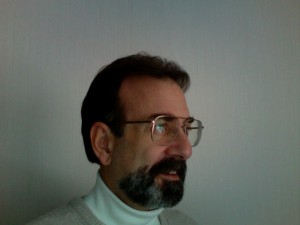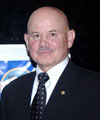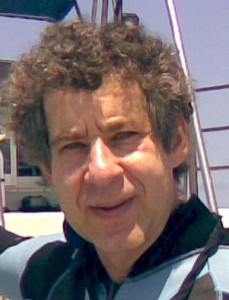
Jon Denn is founder of aGREATER.US an online focus group and virtual National Initiative for Democracy effort to aggregate and rate greater ideas for the US. A convener of conversations. www.aGREATER.US. @jmdenn

Jon Denn is founder of aGREATER.US an online focus group and virtual National Initiative for Democracy effort to aggregate and rate greater ideas for the US. A convener of conversations. www.aGREATER.US. @jmdenn

Now a writer, consultant and public speaker who focuses on politics and government, he was formerly a full professor at the University of Wisconsin, Madison, a senior staffer for the U.S. Congress (Office of Technology Assessment), head of an environmental consulting company, and Director of Environment, Energy and Natural Resources at the National Governors Association. His latest book is Delusional Democracy – Fixing the Republic Without Overthrowing the Government, an original analysis of the decline of American democracy coupled with a set of practical solutions for fixing it. His previous book was Sprawl Kills – How Blandburbs Steal Your Time, Health and Money, a holistic evaluation of suburban sprawl, sprawl politics, and the housing and community alternatives to sprawl. He is a co-founder of Friends of the Article V Convention, its National Press Secretary, and writes regularly for many websites, often advocating the nation’s first Article V convention as the more practical route to restoring American democracy than regular elections controlled by the two-party plutocracy. He can be reached through www.delusionaldemocracy.com.

Jameson Quinn has been interested in election theory for over ten years. He has worked as a programmer and as a Guatemalan public school principal and teacher. He has served as statistical analyst for an independent survey of the quality of Guatemalan voter rolls, and initiated the creation of the consensus Declaration of Electoral Reform Advocates. He grew up in California, studied applied math and cognitive science in Massachusetts and Ohio, and lives in Guatemala.
 The Small Wars Journal Blog has a post previewing a new book by Andrew Mackay and Steve Tatham. Behavioural Conflict: Why Understanding People and Their Motives Will Prove Decisive in Future Conflict considers how the West's Post Cold War conflicts have been fought amongst people rather than between armies. From publisher's description:
The Small Wars Journal Blog has a post previewing a new book by Andrew Mackay and Steve Tatham. Behavioural Conflict: Why Understanding People and Their Motives Will Prove Decisive in Future Conflict considers how the West's Post Cold War conflicts have been fought amongst people rather than between armies. From publisher's description:
“These people, amongst others, have been Mendes, Kissis and Konos (and the 13 other tribes of Sierra Leone), they have been Serbo-Croats, Bosnians, Kosovars, Albanians, Unizzahs, al-Ribads, al-Zobaids, Kurds, al-Montifig (and the other tribal groups of the nearly 40 that make up Iraq), Pashtuns, Hazaras, Uzbecks (and the other 6 ethnic groupings that make up Afghanistan's rich tapestry of population), they have been Sunni, Shia, Orthodox, Agnostic, Christian, Catholic; they have been farmers, politicians, police, administrators, businessmen, narco khans, war lords, men, women and children. In fact you can divide them in any one of a hundred or so different ways but the only certainty is that all of these groups and people will exhibit behaviour, that may appear utterly irrational but for better or worse will have profound effects upon the manner in which military missions are conducted.”
The book is based on a paper written in 2009 for the Defence Academy of the United Kingdom. The tale of the lone Afghan farmer sowing seeds in a field near the Kajaki Dam should be a warning to those from the developed world who underestimate the intelligence of people just because they don't speak English or have grown up without electricity and running water.
This book will have utility for anyone working in military, peacekeeping, policing or any other other cross cultural situation.

Gary I. Wilson: G.I. Wilson is a retired Marine Corps Colonel and combat veteran with 33 years of military service and several years of experience in law enforcement-emergency services. He is a member of the International Association of Chiefs of Police (IACP), Marine Corps Intelligence Association (MCIA), Association of Former Intelligence Officers (AFIO), American Society for Industrial Security (ASIS), FBI Infragard Program, Naval Intelligence Professionals (NIP), Society of Competitive Intelligence Professionals (SCIP), Disabled American Veterans (DAV), Veterans of Foreign Wars (VFW), Military Order of World Wars, Association of Threat Assessment Professionals (ATAP), Forensic Expert Witness Association (FEWA), and serves on the Board of Directors for Bossov Ballet Theatre, San Diego County Crime Stoppers, and Palomar College Education for Heroes Foundation. He is widely published in professional journals, appears on national television, radio, and in documentaries. He coauthored a 1989 professional paper that coined the term “fourth generation warfare (4GW).” He has BA in psychology from the State University of New York at Albany and MA in Bushiness and Organizational Security Management from Webster University. He is currently pursing another graduate degree in forensic psychology. Personal military awards include the Legion of Merit, Bronze Star, and several Combat Action Ribbons.

In 1997, David S. Isenberg wrote an essay entitled, “The Rise of the Stupid Network: Why the Intelligent Network Was a Good Idea Once But Isn’t Anymore.” In it, Dr. Isenberg, then a distinguished member of technical staff at AT&T Laboratories, examined the technological bases of the existing telecom business model, laid out how the communications business would be changed by new technologies, foresaw today’s cataclysms, and imagined tomorrow’s new network.
The essay was released onto the Internet and found its way into the hands of The Wall Street Journal, Network World, and George Gilder’s Technology Report. Of the essay, The Wall Street Journal said, “it may soon assume cult status among the tech mavens that roam the World Wide Web.” Communications Week International said that the essay, “packed power [and] challenged the most sacred assumptions of the telecom world.” Inevitably, the essay found wider acceptance outside of AT&T than within it, and David Isenberg left AT&T to start the company isen.com, Inc., whose mission was to help telecommunications companies navigate from business models based on scarcity, towards new models formed by the abundance of communications infrastructure.
David S. Isenberg’s public delivery of the “Stupid Network” message is passionate and personal. He has spoken to over 100 audiences on three continents, and has been cited in The New York Times, The Wall Street Journal, USA Today, Forbes, Fortune, Wired, Business 2.0, Communications Week International, Network World, Release 1.0, Gilder Technology Report, TheStreet.com, Nikkei Communications, and numerous other publications. He has authored articles for Fortune, USA Today, IEEE Spectrum, MSNBC, Communications Week International, Light Reading, Business 2.0, America’s Network, VON Magazine, and ACM Networker.
Dr. Isenberg holds a Ph.D. in biology from Caltech, and is a Fellow of Glocom, the Institute for Global Communications of the International University of Japan. He is a founding advisor of the World Technology Network, and was a judge for the World Communications Awards in 1999 and 2001.

David Isenberg is the author of the book Shadow Force: Private Security Contractors in Iraq. His blog is The PMSC Observer. He wrote the “Dogs of War” weekly column for UPI from 2008 to 2009. During 2009 he ran the Norwegian Initiative on Small Arms Transfers project at the International Peace Research Institute, Oslo. His affiliations include the Straus Military Reform Project, Cato Institute, and the Independent Institute. He is a US Navy veteran. His e-mail is sento@earthlink.net.
David Isenberg at CATO Institute